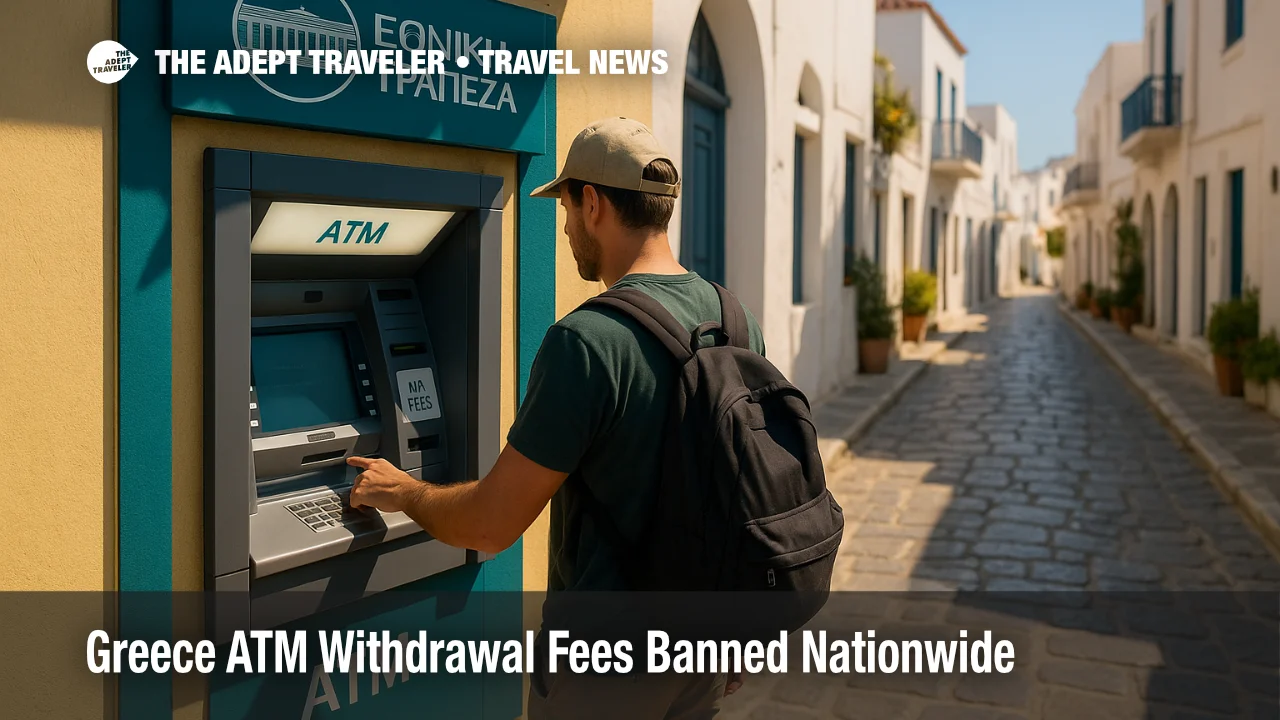Greece ATM withdrawal fees banned nationwide

Greece has eliminated most cash-withdrawal charges at bank ATMs starting August 11, 2025, a Finance Ministry rule that zeroes interbank ATM fees within the DIAS network and sets a €1.50, about $1.65, ceiling at third-party machines. Balance inquiries are free across providers, and a flat €0.50, about $0.55, applies to certain digital remittances from non-bank operators. The move follows public backlash after a major bank offloaded hundreds of ATMs to a third-party firm that then added fees. Lawmakers passed the measure July 25 with a brief transition window.
Key Points
- Why it matters: Lower cash-access costs nationwide, especially in resort areas.
- Travel impact: Third-party ATM withdrawals capped at €1.50, about $1.65, per transaction.
- What's next: Banks may reconfigure ATM networks and signage as rules settle.
- Balance inquiries are free for all cardholders at any ATM.
- Parliament approved the amendment on July 25.
Snapshot
Under the regulation now in force, cash withdrawals at ATMs run by Greek banks are free when both the issuing bank and the ATM participate in the DIAS interbank system. Withdrawals from third-party machines, common in tourist zones and convenience locations, are capped at €1.50, about $1.65, nationwide. Balance inquiries are free regardless of bank or operator, and a unified €0.50, about $0.55, fee applies to digital remittances initiated via third-party providers. Authorities say the policy aims to curb excessive charges and standardize costs after recent controversy over ATM ownership changes. The Finance Ministry indicated the law would take effect in mid-August following its July 25 passage.
Background
The change follows weeks of criticism after Piraeus Bank replaced or sold roughly 850 ATMs to a non-bank operator, sparking new withdrawal fees at machines that had been free for account holders. The backlash pushed the government to pledge intervention, warning that two-tier pricing would not be allowed. Parliament then approved a Finance Ministry amendment that eliminates interbank withdrawal charges at Greek bank ATMs and codifies limits on other fees. The measure established a short implementation window so banks and third-party providers could update systems before the August 11 start date. The reform builds on a broader push to reduce routine banking costs for consumers, a policy signaled since late 2024.
Latest Developments
How the Greece ATM withdrawal fees ban works
From today, Greek bank customers withdrawing cash at any DIAS-member bank ATM will not be charged an interbank withdrawal fee. Third-party ATM providers must treat customers of a partner bank as their own if there is a direct or indirect shareholding link, meaning no extra charge in those cases. If a municipality has only one ATM, withdrawals there must be free for Greek bank cardholders. Everywhere else, third-party withdrawals are capped at €1.50, about $1.65, per transaction. Balance inquiries are free at all ATMs, regardless of bank or operator, and third-party providers may charge €0.50, about $0.55, for sending remittances via web or mobile channels, aligned with bank fees.
Analysis
For travelers, the immediate upside is predictable cash-access pricing across Greece's mainstream banking network. If your card is issued by a Greek bank, interbank withdrawals at Greek bank ATMs are now free under DIAS, while third-party machines cost at most €1.50, about $1.65. If your card is issued outside Greece, your home bank's own international or out-of-network fees may still apply, so check your cardholder terms before relying on repeated withdrawals. Balance checks are free across providers, which can help you avoid accidental overdrafts during a trip.
Industry effects will likely ripple through ATM placement and partnerships. With interbank charges zeroed, Greek banks have fewer incentives to maintain duplicative machines in overlapping areas, and press reports indicate lenders are already weighing shared networks to trim costs. Expect more co-location, clearer fee disclosures at third-party kiosks, and, potentially, a shift toward cash-light habits as digital payments continue to expand. The new ceiling also curbs the steep, opaque charges that often frustrated visitors in high-traffic resort towns, standardizing what used to vary by operator and location.
The policy also responds to consumer trust concerns after ATM ownership changes triggered surprise fees. By legislating a uniform cap and removing bank-to-bank withdrawal charges within DIAS, officials aim to align pricing with expectations and reduce the "maze of fees" effect that can sour a vacation or daily routine. Monitoring will matter, as operators adapt business models to the new rules and update on-screen prompts.
Final Thoughts
Greece's overhaul brings welcome clarity to cash withdrawals, especially in island and leisure destinations where third-party ATMs are widespread. Visitors should still decline costly dynamic currency conversion, stick to Greek bank ATMs when possible, and keep a backup payment method. Watch the on-screen totals before confirming, and save receipts if you need to dispute a charge with your issuer. As banks consolidate networks, signage and on-screen disclosures should make fees easier to understand. For residents and travelers alike, the new cap and interbank fee removal set a cleaner, simpler baseline for Greece ATM withdrawal fees.
Sources
- Greek ban on ATM charges and limits on other banking fees comes into force today, Euronews
- No fees for Greek ATM cash withdrawals as of Monday, eKathimerini
- Parliament approves law regulating ATM fees, eKathimerini
- Greece bans interbank ATM withdrawals fees, ATM Marketplace
- Greek Government Abolishes All ATM Withdrawal Fees, Greek Reporter
- Greek banks plan shared ATM network to cut costs, NoCash.ro
